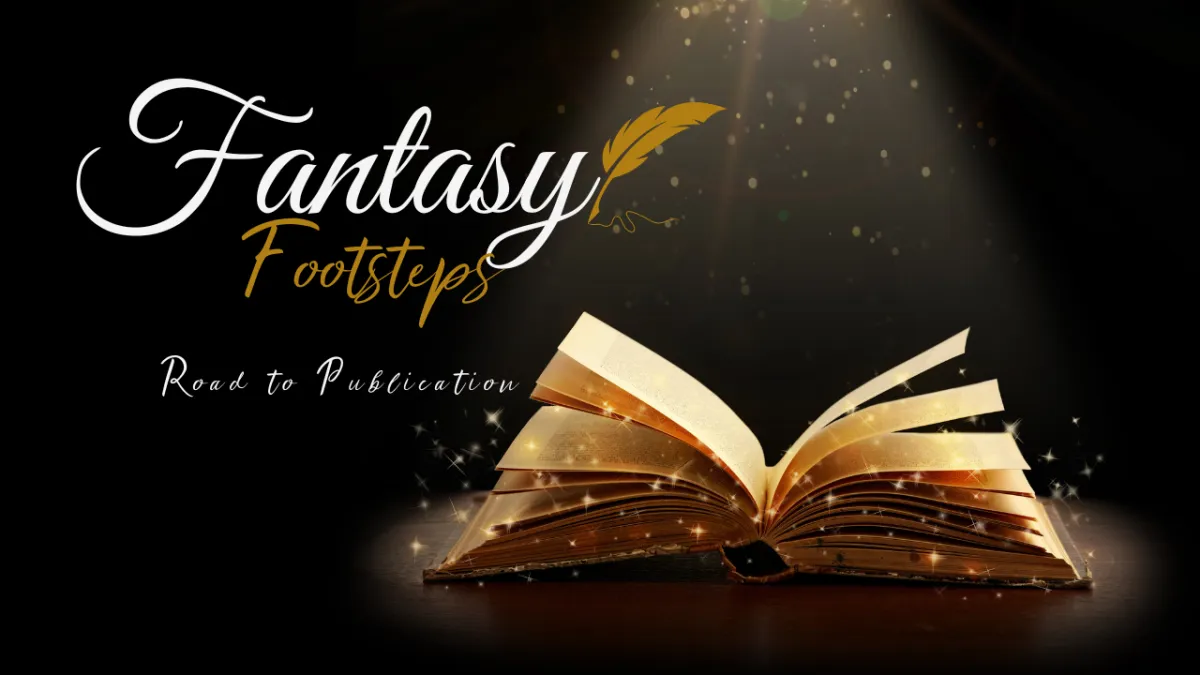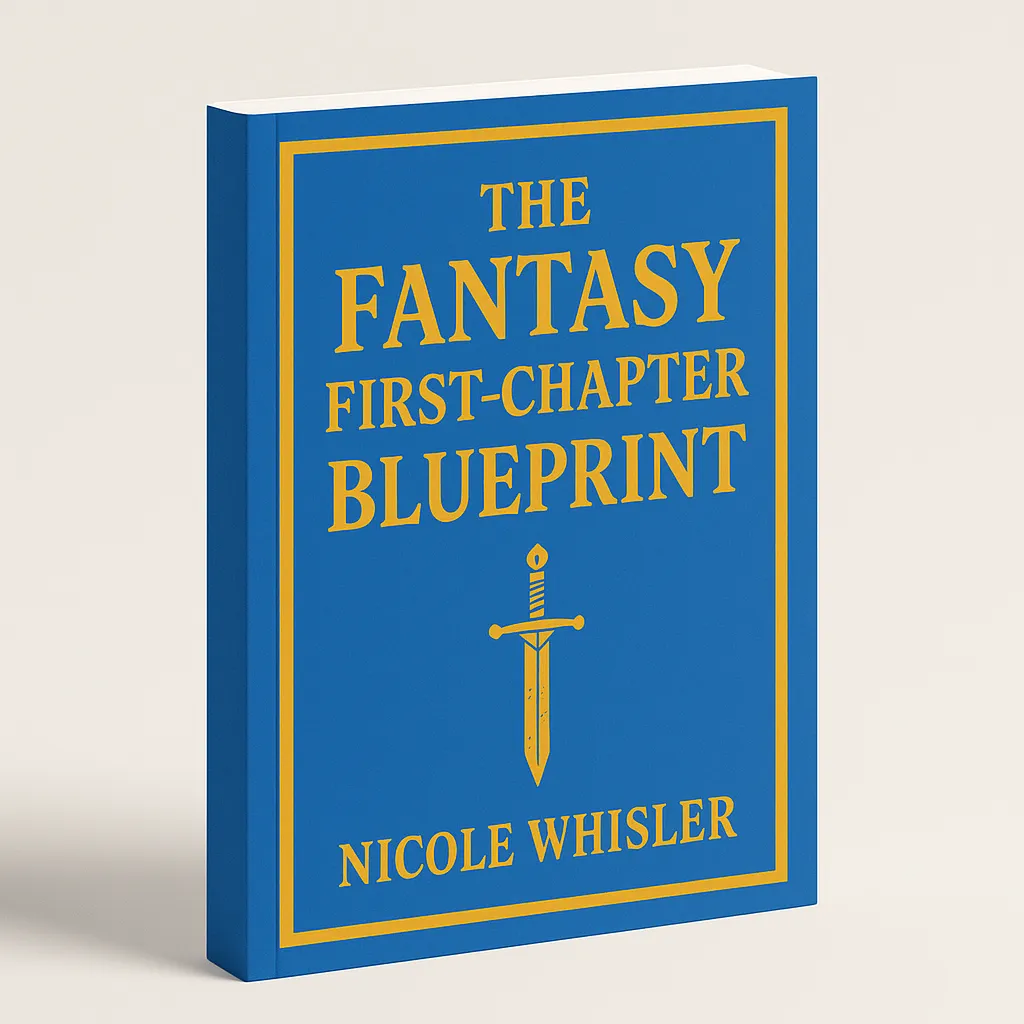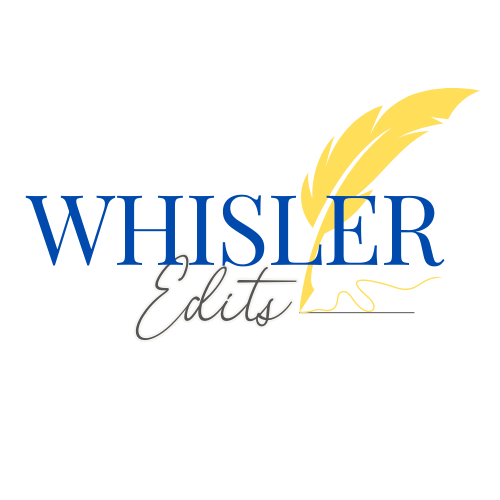The Fantasy First-Chapter Blueprint
Your first chapter is your one shot to hook an agent or a reader. Don't let the 7 deadliest mistakes land your manuscript in the rejection pile. This free 7-day email course gives you the step-by-step blueprint to avoid them and craft an irresistible opening.

Your Novel Matters ...
Looking for the right book coach for your fantasy novel?
Are you a fantasy writer …
… struggling to convert the vivid scenes of your fantasy novel from your imagination to the page?
… stuck in a loop where you constantly rewrite your opening pages?
… worried your story won’t resonate with your readers?
What if I could show you the exact steps week to week that would take you from brainstorming and drafting to revising and publication?
I specialize in developmental editing and book coaching for writers of fantasy novels—writers who value the craft of storytelling and wish to create stories that resonate.
My Services
Develop Your Ideas
Fantasy Footsteps: Road to Publication

I’ll let you in on a secret. All you need to succeed as a writer are three things:
A Roadmap: Illuminate your path with a step-by-step guide, ensuring you achieve your writing goals every week. From outlining to publishing, every stage of your journey is mapped out for success.
Mindset Mastery: Learn how your thoughts control your outcomes in your writing. Overcome self-doubt and unearth the confidence that will bring your unique ideas to life on the page.
Personalized Support: Prepare for comprehensive assistance, real-time accountability, and feedback tailored to your needs. From brainstorming sessions to final publication, you'll have a dedicated ally guiding you every step of the way.
With these three pillars, you'll unlock the potential to:
Craft a captivating story that enthralls readers from the first page to the last.
Develop complex characters and immersive worlds that resonate deeply with your audience.
Navigate the complexities of plot twists and pacing, keeping readers hooked until the final chapter.
Receive specific guidance on refining your scenes so that readers root for your protagonist.
Overcome writer's block and stay motivated throughout your writing journey, ensuring consistent progress.
Transform your rough draft into a polished, professional manuscript ready for publication.
Are you ready to turn your fantasy novel from a mere vision into a masterpiece that captures hearts and minds?
Join Fantasy Footsteps: Road to Publication and begin your author journey with everything you need to write a story that works.
Don't let your story remain trapped in your mind—bring it to life with me!
If you’re thinking, “Yes, please! Tell me what to do!” , I’d like to invite you to work one-to-one with me to finish your novel and write a story that works. Join my book coaching program designed specifically for fantasy writers—Fantasy Footsteps: Road to Publication.

Discover Helpful Tools
Resources For Writers
Here you will find some of my favorite resources for writers.
Add these books, podcasts, websites, and other resources to your writing toolbox to augment your writing at any stage.
Join My Free, Private Facebook Group
Finish My Fantasy Novel: Write & Revise My Best Book in 6 Months
In the group, I go live weekly with writing tips. The group is also a platform for writers to support each other and share their wins and progress.
Live training schedule:
1st Tuesday of the month: Free critique for someone in the group!
2nd Tuesday of the month: Writing sprint with fellow writers
3rd Tuesday of the month: Live training on a specific topic
4th Tuesday of the month: Interview with an author or marketing/business expert


Improve Your Craft
Writing Advice Blog
As a developmental editor and book coach, everything I post is designed to help you build your creativity, strengthen your prose, and explore new avenues in your writing. The opinions in each post are my own, but many are inspired by ideas from established authors and editors who excel in their fields.
Rely on my blog for clear and specific writing advice, motivational tips and grammatical aid, and interviews with experts!
Hi! I'm Nicole.
I’m a Developmental
Editor & Book Coach for Fantasy Writers.
Like you, I'm a writer. I understand the mental and emotional ups and downs of storytelling. Don't let resistance win! Recognize the value of good advice plus hard work.
My approach to novel writing is multifaceted. For a deeper understanding of my process and style, take a look at some of my favorite craft-of-writing books in my Resources section.
What can I say about myself? I read, I write, I read about writing, and I write about reading. It never gets old to me.

See what writers like you are saying . . .

Nadir Shirazi
“I’ve been stalling on my Islam-inspired sci-fantasy series for 10 years. But within 10 minutes of starting Nicole’s program, I started writing again."

Amanda Emerick
“I can’t recommend Fantasy Footsteps enough to writers who are legitimately looking to polish their craft, write, and eventually publish their novel."

Trinity Cunningham
“I loved discussing my story with Nicole. She provided me with invaluable insights I never would have considered on my own."
Latest on the Blog

You will find no pictures of kittens here. No images of favorite dessert recipes, snapshots of my recent vacations, videos of puppies playing the piano (although I do love dogs), or YouTube clips of monkeys stealing people’s sunglasses.
I’m genuinely sorry if that disappoints you.
Instead, you can rely on my blog for clear and specific writing advice, motivational tips, grammatical aid, and author/editor interviews.
As a developmental editor & book coach, everything I post is designed to help you build your creativity, strengthen your prose, and explore new avenues in your writing. The opinions in each post are my own, but many are inspired by ideas from established authors and editors who excel in their fields.
Some of these tips might be just what you need to hear. Others might not work for you personally, and that’s okay.
Apply the tips that fit your personality and writing habits, and feel free to adapt or ignore the others. For further questions and comments, you can email me or reach me through my Contact page.

Move Past Perfectionism and Finish Your Book!
Discover in this post …
examples of perfectionism in my own life.
the cost of staying a perfectionist.
three simple strategies to help you erase perfectionism during the drafting stage.
Awkward Teen, Awesome Teacher
I took a math test in eighth grade and couldn’t sleep that night. With my head on the pillow, I grew hyperaware that I’d gotten a question wrong. My common sense told me to forget it, but the perfectionist side of my brain couldn’t do that.
This is a true story, for anyone wondering.
The next morning, I showed up at school and made a beeline for my math teacher’s class.
I was an awkward teenager—the kind of student who’s incredibly shy, yet cares so much about her grades and schoolwork that she’s willing to be bold and advocate for herself in that area.
I approached my math teacher and asked her if she had graded the tests yet. She hadn’t. I asked her—I can’t believe I did this, but I truly did—whether it might be possible for me to fix one question on the test. I told her I SWORE I hadn’t looked at my notes, I hadn’t looked in the book (both true); I had simply realized the night before that I’d made a terrible mistake on one specific problem. It was gnawing at me, and I couldn’t let it go.
Here’s the kicker: she looked at me, shrugged, and handed over my test, allowing me to fix my error!
To this day, I’m not sure if it was because I was a good student, because she was a kind and understanding teacher, or because she didn’t think it worth the hassle to refuse. (Ironically, around ten years later, I became a teacher myself, and under no circumstances would I have allowed a student to do this.)
But I fixed that question, earning me another few points on that test.
This is the story of someone so ingrained in her own perfectionism, so intent on doing everything right, that common sense gets in the way. I went through a disproportionate amount of stress when you compare it against the result of the slight increase in my test score.
Perfectionism hits hard for many writers looking to finish their manuscripts. It’s easy to put an extreme amount of pressure on ourselves as we outline and draft. On the outside, we tell ourselves, “I’m working on a book. No big deal,” while our subconscious says, “This must be the most outstanding first draft ever written, or else I’m no good as a writer.”
When perfectionism costs us time and adds stress to our writing lives, it’s important to look at ways to move forward anyway so that we can stay on track and achieve our original goals. Before we dive into three ways to combat perfectionism, let’s identify whether you are, in fact, a perfectionist—because sometimes it rears its head in sneaky ways.
Are You a Perfectionist?
Perfectionism often manifests itself in an “all or nothing” personality. You’re either exercising five days a week, or you’re not exercising at all. You’re completely on track with dishes and laundry, or your house is a disaster. You’re writing every day, or you haven’t touched your manuscript in months.

Can you relate to that?
Another way perfectionism shows up is in the way you approach your draft. Do you edit as you write, constantly backtracking and revising your opening chapters? I’ve had clients who rewrote their first 20,000 words for five to ten years before finding me.
It’s easy to tell yourself you have no choice (“That’s just how I write”), but until you’ve opened your mind to new strategies—and actually tried them—you don’t know for sure.
In many cases, I’ve found that perfectionism is tied to fear.
Right before the fall semester of my junior year of high school, my brilliant English teacher signed me up for debate class. She knew my older brother was in debate and great at it, and she knew I was a good student who needed to come out of her shell.
Rather than accept the implied compliment and try something new, I immediately called the school and removed myself from the list.
I was terrified. Being in debate class meant you had to think on your feet in front of other people. If I didn’t think I could do something well, I wasn’t interested in doing it at all (hello, perfectionism). At the time, I didn’t view myself as someone who could do difficult things, so I took the easy way out. No way was I subjecting myself to potential humiliation.
Looking back, I wish I had challenged myself. I wish I had asked myself, What’s the worst that could happen?
Even if I had publicly humiliated myself in debate (lost track of the conversation, forgotten what I was supposed to say, etc.), I would have survived, and I would have exposed myself to some essential life skills.
But because I doubted I could do it perfectly, I decided it was better not to try.
Almost twenty years later, after experiencing life as a full-time teacher, a developmental editor, and now a book coach, I’ve learned that pushing myself into uncomfortable situations is the best thing I’ve ever done to develop my personality and skill set.
So if you’re someone who thinks, “My writing methods work for me,” but you’re scratching your head as to why your draft is still incomplete, I’d encourage you to try the three strategies below.
What’s the worst that could happen?
1. Realign Yourself with Your Goal

What’s your exact goal related to your draft? Is it “I want to finish my draft by the end of next month”? Or “I want to write 2,000 words a day, 5 days a week”? Sometimes we don’t have goals in mind at all, meaning we haven’t pinpointed what we’re working toward. And it’s hard to feel accomplished when we don’t know exactly what we’ve set out to do.
Other times, we set goals and then forget them. This is why I recommend writing down your goal and putting it somewhere you’ll see it on a regular basis.
If you get off track—say you get sick, or you binge-watch Netflix, or you beautify your author website for hours, or you worldbuild and you worldbuild and you WORLDBUILD but you never write—ask yourself, “Is it still my goal to finish my draft by the end of the year? Is that something I still want to accomplish, and is that my priority right now?”
If your answer is yes, then it becomes a simple matter of problem/solution.
Problem: Binge-watched Netflix and got behind in my draft
Solution: Write during my lunch break / Write on a weekend / Get up early to write (until I’m caught up)
It’s easy to get lost in the weeds of your draft and lose sight of what you’re trying to accomplish, but clarifying your goal and reminding yourself of it every day will help you move forward rather than backward in your manuscript.
2. Use TK
If you’ve never used this handy tool, I’m excited for you to try it!
TK is a placeholder that stands for “to come,” but we use a K instead of a C because there are very few words in the English language with the letters TK placed side by side, certainly none you’d use on a regular basis. This allows for easy findability once you’re ready to fill in your placeholders.
How might this help you, you ask?
The next time you’re staring at your screen, trying to come up with the perfect description of your hero’s surroundings but nothing comes to mind, write “TK: description of creepy forest” and move on!
Maybe you’re writing a witty dialogue scene and you sit for ten minutes, trying to come up with a perfect comeback for your character. Instead of waiting for inspiration to strike (she’s a fickle beast, after all), write “TK: witty comeback” and move on!
Maybe you love to write suspenseful chapter endings, and you’re feeling the pressure to come up with something perfect for Chapter 20, but nothing fits the bill. Write “TK: chapter ending that increases tension” and move on!

Then, when it’s time to revise, you can use the Find feature to jump easily from one TK to the next, filling in the answers using your editing brain rather than your first draft brain.
Using TK keeps us from perfectionism because it ensures we’re never stuck for long. It erases the pressure we often put on ourselves as writers to write something amazing the first time through. Our first drafts can be “good enough,” and we can become perfectionists when it’s time to be a perfectionist: in the revision stage.
3. Solidify Your Outline from the Start
As I mentioned, perfectionism in our writing often stems from fear. What if I don’t write a character my readers love? What if my plot isn’t creative enough, or tight enough, to hold my readers’ attention?
We can combat these fears by organizing our thoughts into an outline from the start. If you’re writing for a commercial audience, and your goal is to connect with a wide readership, you’ll likely gain the most confidence in your draft if you use a structure that has been proven to resonate with readers. I love Shawn Coyne’s Story Grid and Jessica Brody’s Save the Cat! Writes a Novel, but you can use any model you like. I’ve read many books on how to structure a novel, and I’ve found that plenty of experts are making similar points but using different wording, so choose one that appeals to you.
Once you hit the drafting stage, you can adjust your outline anytime it makes sense to do so. New ideas can be fun to integrate into your story! But whether you end up altering items or not, if you know your outline works from the start, you’ll gain confidence that you’re not wasting your time in your draft, and your excitement will help fuel you to finish your work as a result.
You’ve Got the Power
I’d like to leave you with a final thought, and it’s slightly controversial:
Finishing your draft will take as long as you choose for it to take.
If you’ve set your goal, and you’ve prioritized your goal, and you’re taking action toward that goal, the only thing that typically gets in the way of achieving that goal is … you.
Yes, extreme situations sometimes arise: a death in the family, an unexpected time commitment outside your control, etc., but in most cases, we’re simply wading through everyday life, encountering all the usual setbacks, while watching our original goal of finishing our novel sometime this year get farther and farther away.
When that happens, it’s usually because we’ve lost sight of our goal or we didn’t prioritize it. One of the first things I do with the writers I coach is ask them why their goal is nonnegotiable. What makes finishing their novel something they’ve decided to accomplish, no matter what gets in their way? Identifying their compelling reasons and planning what to do if something unexpected crops up (doesn’t it always?) ensures that they have both a primary plan and a backup plan. They’ve decided ahead of time exactly what they’re going to do, and I’m there to hold them accountable.
Do you believe that finishing your draft will take as long as you choose for it to take? Or do you see yourself as subject to the muse, only able to write and produce work at certain times?

Set your goal, prioritize your goal, and use the punting technique of TK throughout your draft to keep you from succumbing to perfectionism along the way.
That’s how your unfinished draft will turn into a novel.
Fighting perfectionism during the drafting stage is a battle that gets easier over time. Pride yourself on setting realistic but challenging goals, taking those goals seriously, and making your writing nonnegotiable (because if it’s not nonnegotiable, you’ll let yourself get out of it). You’ll build trust in yourself and finish your novel one day at a time, one step at a time. And if you resonated with this post, don’t hesitate to email me at [email protected] to let me know your thoughts and fill me in on how your progress is going!
Do you want to learn how to write a story that makes your target readers stand up and cheer? If you’d like support from A to Z (from brainstorming to drafting to revising to publication), book a Discovery Call with me to see if you’re a good fit to join my book coaching program, Fantasy Footsteps: Road to Publication. And if you haven’t done so already, grab your Free Guide on how to hook readers from your story’s start!

Capture Your Readers from Your First Scene
Get my exclusive blueprint—7 Mistakes to Avoid in Your Fantasy Novel’s Opening. Start your fantasy novel right!
Are you worried you've failed to establish a bond between readers and characters in your first chapter? Do you wonder if you've bogged readers down with your worldbuilding? Do you sometimes overlook essential conflicts? Many readers will put your book down if it doesn't grab their attention right away, so it's vital to evoke powerful emotions from readers as early as possible.
Don't let these common mistakes rob your story of its magic and momentum. Save your precious time and energy by ensuring you hook readers from the start. Grab your guide now and check your opening against these common missteps!
(You will also receive monthly writing advice, updates about my free live trainings, and direct access to replays. Unsubscribe anytime.)

